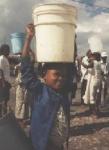Too Little, Too Far, Too Expensive - Water in Port au Prince
 Let's face it - life is fragile. One mosquito bite or one glass of questionable water makes the difference between good health one day, and sickness the next. In developing countries such as Haiti, the very water needed to survive can also cause sickness and, for the young, even death. In Port au Prince, the wealthy purchase treated water while the poor depend on crumbling infrastructure. A documentary entitled "Drop for Drop" explores access to water in Haiti's largest city.
Let's face it - life is fragile. One mosquito bite or one glass of questionable water makes the difference between good health one day, and sickness the next. In developing countries such as Haiti, the very water needed to survive can also cause sickness and, for the young, even death. In Port au Prince, the wealthy purchase treated water while the poor depend on crumbling infrastructure. A documentary entitled "Drop for Drop" explores access to water in Haiti's largest city.
The lack of access to water is both a disease burden and a time burden, particularly for women and girls who bear primary responsibility for collecting water, often multiple times a day. After collecting water from the crowded collection points, women and girls carry the buckets on their head to their homes. It is a recipe for back and neck problems.
Is water a commodity, a public service, or a right? Perhaps it is all three. Certainly, the majority of the Port au Prince populace is not going to be able to buy treated water. Some will be able to buy bleach and treat the water in their homes. But this, the most basic of public services, should be a priority.
According to Paul Constance, the national water authority (CAMEP) is heavily indebted and has stopped maintaining a number of water points - as you can imagine, the water points receiving the least maintenance are in the poorer neighborhoods. Private wells and distribution trucks fill the gap. The poor are least able to afford these services. He advocates for the extension of a single water pipe to a neighborhood, after which water committes (who are elected) take full responsibility for distributing the water to points throughout the neighborhood and for collecting payments. Considering that only 10% of homes have water connections, this is a practical approach. Perhaps the most challenging part of this approach is gaining consensus from all the different stakeholders in a community from civil society to gangs.
Port au Prince is a thirsty city that continues to grow. More than water projects, Haiti needs water systems. Innovative approaches that involve the government but promote community management are more sustainable than other approaches.
The excerpt is quick but emphasizes the importance of meeting the need of all the city's citizens. Welcome your thoughts.
Bryan
Add new comment